by Margot Sands – Ekar Farm – Boulder, Co Parasha Netzavim This week’s Torah portion, Netzavim, offers us the warning of risks and rewards that could result from engaging in Judaism. See for yourself in a snapshot of this week’s Torah portion: Moses delivers a message from G-d about the consequences that may be endured as a result of committing to the Jewish faith. What will happen if we do all that has been commanded of us as Jews? We are given the world. Protection. A full, happy life. Fruits of the earth, of the trees, of the next generation. G-d even offers to plot revenge against our enemies. However, the dark consequence bestowed upon us comes from an angry, spiteful G-d. If we don’t choose the faithful life, then we are choosing death and will perish by the wrath of G-d. As I read this Torah portion’s translation, I was stunned by the dichotomy of choices. We can choose the path of a devout Jew, or we can choose to suffer dire consequences. The reward: a gloriously full life following the word of G-d; The risk: taking a misstep in devotion and enduring G-d’s wrath. This contrast of choices […]
Tag Archives | Ekar Farm
Parashat Tazria-Metzora | D’varim HaMakom: The JOFEE Fellows Blog
by Margot Sands, Ekar Farm – Denver, CO This week’s Torah portion, Tazria-Metzora, continues to outline specific laws of purification for newborns, mothers, and sufferers of leprosy such as circumcision, immersing in the mikvah, and solitary confinement. Leprosy? Why is this disease addressed alongside the beautiful cycle of life? These different states of being appear together as forms of distractions that prevent us from fully engaging in spirituality. Newborns might be physically distracted from their new existence in the world; new mothers are distracted by on-going pains and stresses of labor and taking care of infants; leprosy is also a physical distraction as an irritating skin ailment. The laws instructed in this text aren’t necessarily targeting these groups of people as dirty, unclean, unwanted, but rather as folks who have barriers to accessing the divine. While we read this parsha throughout the week, we are also tasked with “Counting the Omer,” an active 49-period of time between Passover and Shavuot. An omer is a measurement of barley that was offered to the Temple in Jerusalem in biblical times everyday until Shavuot as a reenactment of the Jewish people wandering in the desert after being liberated from Egypt. In present times, we […]
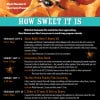
Bees and Honey 101, Build your own hive, Bee Movie screening and more!
How Sweet It Is! A series of honey and bee-related programming hosted by Ekar Farm, Mizel Museum and Hazon.
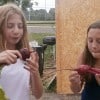
Register for Camp Ekar
This summer, Ekar will host their first summer camp program for children ages 7-11.
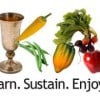
The Tour De Farm 2012!
Farm to Farm Bike Ride in Colorado! Special program for teenagers.
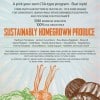
Become a Harvest Sponsor at Ekar, Denver
Come enjoy harvest time in Ekar’s fields. Pick some veggies for donation to JFS Weinberg Food Pantry and pick some some for your family.
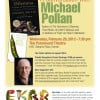
A Conversation with Michael Pollan
Ekar Farm Hosts Michael Pollan, Author of the Omnivore’s Dilemma at the Paramount in Denver

Of Bees and Men: Fixing the Bee Problem
Originally posted on the Jew and the Carrot During the first summer in my current home in Denver, there were plenty of bees in the garden. Every time I walked outside to see how things were growing, I could see the bees buzzing around the plants, happily pollinating my zucchinis and herbs. I had an abundant harvest that year; in fact, I probably still have some pesto in the freezer. The next summer, there were almost no vegetables to harvest. And upon reflection, I realized there were also no bees. That was the summer of 2006. (more…)
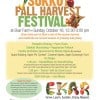
Sukkot Fall Harvest Festival at Ekar Farm
October 16th, 12:30-3pm 6825 E. Alameda, Denver, CO FREE ! Pumpkin Picking, Farm Tours, Live Music, Vegetarian Potluck, Sukkah Decorating, Apple Pie Contest, and many Family Fun Activities sponsored by Wacky Apple (more…)
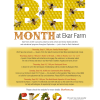
Honey, Its Bee Month at Ekar Farm
Click flyer for a larger view. (more…)



